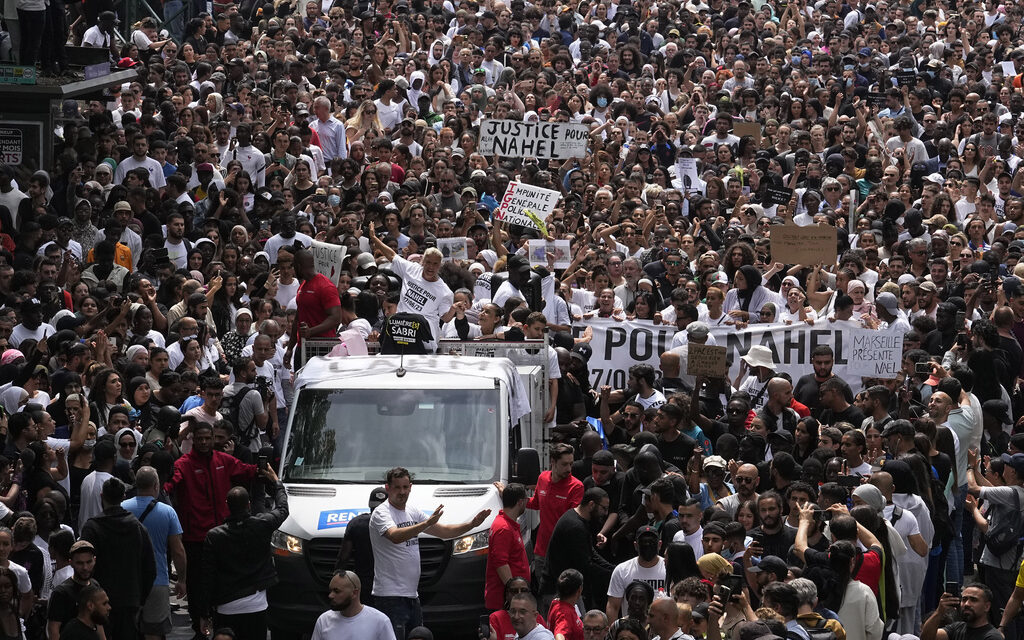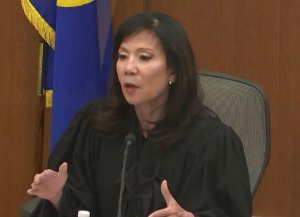By DaQuan Lawrence,
AFRO International Writer,
DLawrence@afro.com
As the June 27 traffic stop-turned-killing of Nahel Merzouk, 17, in Nanterre, France, led to weeks of nationwide protest and social unrest, many are saying the authorities’ overtly militarized response mirrors France’s history of colonialism and anti-Black oppression.
The weeks following Merzouk’s unlawful death were filled with acts of international solidarity. French singer Slimane exclaimed “racism is no longer hidden” in France, and the human rights organization Amnesty International declared that the French government should “prioritize the reform of rules governing the use of firearms and lethal force.”
“After this tragic murder, Nanterre expressed its rage and sadness, and Ms. Mounie, Nahel’s mother, was supported by people from various communities. We have seen a lot of support through social media,” Audrey M., an activist and independent photojournalist who was on the scene in Nanterre.
“After the march, I received messages from Germany, the U.S., Lebanon, Ireland, Spain, Italy, Greece and Iran to show support, and funds are being raised,” Audrey continued.
Unexpectedly, the wife of Florian Menesplier, the officer who killed Nahel, was awarded €1.6 million (US $1,702,923.20) after a GoFundMe was created on the family’s behalf “to help” because Menesplier’s “salary was to be suspended.”
The fund is emblematic of the situation in France–riddled with racial undertones and political implications as it was created by right-wing politician Jean Messiha, who previously worked with far-right presidential candidates Marine Le Pen and Eric Zemmour. Menesplier’s fund raised more money than the one created for the slain youth.
It was an increasingly conservative political environment that prompted the passage of former Prime Minister Bernard Cazeneuve’s 2017 public security law, an anti-terrorism legislation that has given police the space to use lethal force.
“Deaths like Nahel’s are multiple because of a law voted in 2017 which authorizes the police to shoot when a vehicle does not want to stop, but it must consist of a threat to public safety,” author, freelance journalist and feminist activist Nesrine Slaoui told the AFRO.
Since 2022, about 15 people have been killed by law enforcement during traffic stops across France. In early June, a young man by the name of Monzamba died on a motorcycle in Sarcelles after being chased by police.
“This was not the case (the criterion of a threat to public safety) for Alhoussein, killed a few days before Nahel, or Rayana, killed almost a year before in the same circumstances,” Slaoui, who is of Moroccan descent and has written two books about being an Arab woman in France, told the AFRO.
Fifteen days prior to Nahel’s death, Alhoussein Camara, a 19-year-old Guinean, was shot on his way to work in western France after allegedly refusing to comply with a police traffic stop. Rayana was a 21-year-old woman killed on June 4, 2022, during a police check in Paris.
“The protests are the results of a process connected to systemic racism and the way of operating of the French police that mainly targets people of color, especially young men,” Balogun Ola-Davies, an “Afropean” architect and illustrator of Nigerian and Sierra Leonean descent, told the AFRO.
There have been numerous interpretations of the situation in France by various media platforms, with some outlets mischaracterizing peaceful protestors as rioters.
“It is disheartening to witness tear gas grenades launched at a crowd comprising young individuals, grandmothers and grieving families who have already suffered an unimaginable loss,” Ola-Davies said.
The architect, who resides in Champs-sur-Marne, the suburbs east of Paris, stressed that when actions carried out by Black and Arab communities are labeled as “riots,” it intentionally carries a negative undertone. The language amplifies the perception of violence and disorder, as opposed to protests led by predominantly White individuals, such as the Gilet Jaunes protestors who have demonstrated in major French cities every Saturday since Nov. 17, 2018.
Audrey, Slaoui and Ola-Davies all mentioned the recent protests are unique due to the prevailing weariness and anger about several racially motivated police abuses and because many demonstrators are under 18 years old.
“The media unjustly and deliberately labeled the gathering as a ‘riot,’ instead of acknowledging these events as peaceful demonstrations, which exhibits a biased treatment toward participants in collective movements based on their ethnic and social backgrounds,” Ola-Davies, who is also a social activist and member of the “Verité et Justice Pour Gaye” committee, said.
Verité et Justice Pour Gaye is a human rights group fighting for acknowledgement of the police’s responsibility in the death of Gaye Camara, a 26-year-old Black man killed by officers during a police intervention on Jan. 16, 2018.
Nahel’s death by law enforcement is the latest in a trend of recent and historic police transgressions and acts of violence towards French civilians of African and Arab descent, who are disproportionately surveilled due to the composition of their communities.
“’Quartiers populaires’ (working-class neighborhoods), are structurally under-resourced areas where most people from African communities live. They are associated with ‘ghettos’ due state policies,” Ola-Davies told the AFRO.
“These communities are characterized by a distinct system of police management, and landlords adopting a ‘logic of concentration’ that distributes the population in buildings according to skin color and nationality,” he continued.
In the nation internationally known for the 1789 French Revolution and creation of the Declaration of the Rights of Man and the Citizen, the relationship between law enforcement and members of historically marginalized communities reveals a duality.
In addition to police killings, law enforcement across France were cited for numerous accounts of cruelty and militarized tactics toward non-protesting and protesting citizens, such as using nonlethal bean bags as firearm ammunition and other military-grade “anti-riot” weapons.
During the night of June 28-29 protests, Nathaniel, 19, was blinded after receiving a projectile to the face while returning home from a birthday party in Montreuil, France.
On June 29-30, a young man was injured by an LBD, a defense ball launcher, shot by an officer in Nanterre following the death of Merzouk. The man suffered severe head trauma and was hospitalized for approximately 20 days.
After attending a march for Merzouk, a young man named Virgil, a French Army veteran, lost an eye after being targeted by French authorities.
On June 30, a 22-year-old man was shot in the eye by French police during an urban revolt and injured. He has undergone two surgeries, and his lawyer filed a complaint for aggravated violence.
During the night of protests on July 1 and 2, Jalil, a non-protestor, now 16, was hit by LBD fire in a city about 15 kilometers south of Paris and now struggles with sight in his right eye.
Mathieu Rigouste, an independent social science researcher and author of “The Enemy Within: A Colonial and Military Genealogy of Security Directives in Contemporary France,” reflected on the philosophy and history informing French police behavior via tweet: “In its ideology and practices, the French police has domesticated the counter-insurgency doctrine created in the Algerian War and is redeploying it to ensure the control and repression in colonized territories, prisons, segregated neighborhoods, struggles and social revolts.”
The Algerian War, fought from 1954-’62, was a conflict during which the former North African colony of Algeria secured its independence. The brutality of the methods employed by French forces during the revolt turned not only the French public against it, but also tainted the European powerhouse’s prestige abroad.
Audrey argued that the animus against Arabs and Blacks demonstrated in that war has carried through into current times, propagating laws that incite police violence toward civilians.
“There are many cases of murders against minorities since then, and the state violence against minorities is normalized and systemic. Even the United Nations has warned the French government and asked them to reform its police due to concerns of racism,” Audrey told the AFRO.
“The 2017 public security law [seemingly] constituted a true license to kill,” Audrey added, “and post-colonial migrants have been socially and racially discriminated against. So, if you are Arab or Black in France, your chance [of being] killed by the police is higher.”
The post France’s militarized law enforcement continues a history of anti-Black racism appeared first on AFRO American Newspapers .










